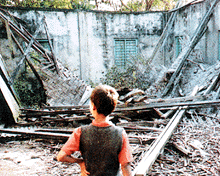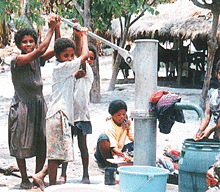Reconstruction projects to assist the self-help efforts of stricken countries
Speedy restoration and reconstruction after a disaster require vast resources-financial, personnel, and material. To support the self-help efforts of a stricken country toward reconstruction, Japan provides financial assistance, supports restoration projects, dispatches personnel, and supplies materials and equipment for reconstruction.
Bangladesh: assistance in reconstruction after cyclone disaster

The roof of this elementary school was blown off in a cyclone.
The cyclone that hit Bangladesh in April 1991 caused enormous damage, including about 140,000 deaths. Immediately after the disaster, Japan provided a loan for emergency items and also extended grants for the restoration of roads, agricultural land, and other facilities that had been damaged. Furthermore, Japan provided grant aid for the construction of shelters that can be used for evacuation, with a capacity of about 2,000 people per shelter. Ten of these shelters have already been completed, 15 are under construction, and 15 more will be constructed in the future. These shelters are multipurpose facilities, which, in ordinary times, can be used as elementary school buildings. As the shelters also contribute to the spread of education in Bangladesh, they have become a symbol of reconstruction in the country. In addition, in the area of software, Japan cooperates in the construction of a radar network in Bangladesh that will keep residents informed of meteorological data.
Philippines: assistance in reconstruction after eruption of Mt. Pinatubo

Beginning the supply of water for living purposes
After the disaster caused by the volcanic eruption of Mt. Pinatubo in the Philippines in 1991, it was necessary to implement rehabilitation and reconstruction plans in a comprehensive manner when facing the continuation of secondary and subsequent disasters, such as mud flows, and urgent issues such as the resettlement of victims. Therefore, Japan has also extended a wide range of assistance, including loans for emergency items, grants for the supply of materials and equipment for rehabilitation, grants for the supply of water for irrigation and living purposes, the dispatch of Japan Overseas Cooperation Volunteers and experts, and support for the activities of non-governmental organizations. Among these, regarding the resettlement of victims, Japan has contributed immensely toward enabling the victims to rebuild their lives through the activities of the JOCV members, two grass-roots grant aid projects, and subsidies for four NGO projects. As a result, it has become possible to grow rice, tomatoes, watermelons, and other crops.
Back to Index
